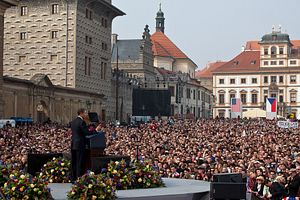The fourth and likely final Nuclear Security Summit (NSS) again highlighted the greatest security threat to the world: nuclear terrorism. U.S. President Barack Obama and other world leaders in the Summit have consistently championed the “central and unique role” of the International Atomic Energy Agency (IAEA) as the lead international coordinator on nuclear security initiatives. In reality, however, the IAEA is hindered by inherent challenges to nuclear security, highlighted not at the NSS but at the NGO Side Summit: Solutions for a Secure Nuclear Future. Moving forward, successful measures to counter contemporary nuclear security threats call for more dynamic, IAEA-led, collaborative efforts.
Specifically, speaker Ambassador Rafael Mariano Grossi, former chief of cabinet in the Office of the Director General and Assistant Director General for Policy of the IAEA, outlined two challenges the IAEA faces. First, states are hesitant to permit the IAEA to have a lead coordinating role on nuclear security initiatives. Second, there is a gap between the 53 nations that participated in the NSS and the 168 member states of the IAEA. This disconnect is indicative of the international community failing to recognize that a major failure in nuclear security resulting in nuclear or radiological terror will have a widespread impact. Nuclear security is a global problem that requires a global solution. The 2016 NGO Side Summit Statement puts it well: “any nuclear terrorist event anywhere in the world will have profoundly negative consequences for the economies, societies, and security of all nations.” Moving forward from the final NSS, solutions to nuclear security require international cooperation beyond what we have seen so far and an IAEA enabled to lead those efforts.
While the NSS is a more than valiant attempt to draw attention to the threat of nuclear terrorism, aspects of the NSS are inherently problematic. In a spirited speech at the Side Summit, Grossi disclosed that the exclusivity of the Summit cripples the IAEA’s ability to act as lead coordinator in implementing nuclear security initiatives around the world:
“It is curious to see that in Vienna we cannot mention the Nuclear Security Summit. It sounds comical, but you cannot. If you mention the Nuclear Security Summit, you will have one or the other delegation that is not invited to the club object of course, because they are not invited. And why are they going to receive instructions from a club of 53 nations that get together? It’s a problem.”
It is unclear how and why participants are included or excluded from the NSS process. What is clear, however, is that participation can be a badge of political legitimization, as in the case of Azerbaijan. Though Azerbaijan has participated in the summits since 2012, its invitation to the 2016 NSS was celebrated in local media. AzerNews quoted Rob Sobhani, former Georgetown professor and head of Caspian Group, as extolling Azerbaijan’s inclusion in the Summit because it “signals the importance of Azerbaijan on the global stage… [It] is no longer a ‘former republic of the Soviet Union,’ but a responsible, trusted and reliable partner of the community of nations.”
In comparison, just south of the border, Iran was not invited to the 2016 NSS. After the remarkable success of the Joint Comprehensive Plan of Action (JCPOA), Iran constitutes a high-profile exclusion from the Summit. While the decision, reportedly a response to Iran’s continued ballistic missile tests, is understandable, it undermines some of the Summit’s ultimate goals. According to Kelsey Davenport of the Arms Control Association, another participant in the Side Summit, the appeal of participating in negotiations with other world leaders would have further incentivized Iran’s compliance with the JCPOA. Additionally, Iran’s participation in the Summit process might have provided an opportunity for Iran to be more transparent about its opaque nuclear security regime.
Rejecting Iranian participation in the Summit discourages compliance instead of facilitating engagement with global nuclear norms. This exclusion is especially poignant in that Iran is a signatory to the Non-Proliferation Treaty (NPT); India, Israel and Pakistan, all of whom have regularly participated in the Summits, are not. This seemingly selective invitation method adds a level of politics that takes authority away from the Summit. The impact of the NSS, like that of the NPT today, is limited as a platform for global initiatives by its exclusivity.
Ultimately, tackling the threat of nuclear terrorism and nuclear security measures more broadly requires strengthening the role of the IAEA. This will not necessitate a trade off in national sovereignty or security. States with nuclear weapons programs are faced with the task of promoting nuclear security while simultaneously safeguarding the integrity of their sensitive nuclear military materials. As highlighted by John Carlson of the Nuclear Threat Initiative at the NGO Side Summit, most military materials are not in military custody; about 80 percent is not in classified forms (e.g. bulk material, materials being prepared for naval propulsion, research reactor fuel). Allowing the IAEA to truly play a lead facilitating role in pursuing nuclear security around the world will not require states with nuclear weapons to compromise their nuclear deterrent. Confidence building measures between states are necessary at an internationally verifiable level, but, as Carlson observed, “confidence building does not mean compromising sensitive information.”
Preparation for and commitments made at the upcoming IAEA International Conference on Nuclear Security in December 2016 are key steps in pursuing more global, multilateral work to protect against nuclear terror. As Grossi rightly declared, genuine international norm-making and “bridging the gap will take a dedicated diplomatic effort.”
Mariah A.V. Hays is a research intern at the Stimson Center in Washington, D.C.
Hannah E. Haegeland is a Scoville Peace Fellow at the Stimson Center in Washington, D.C.

































